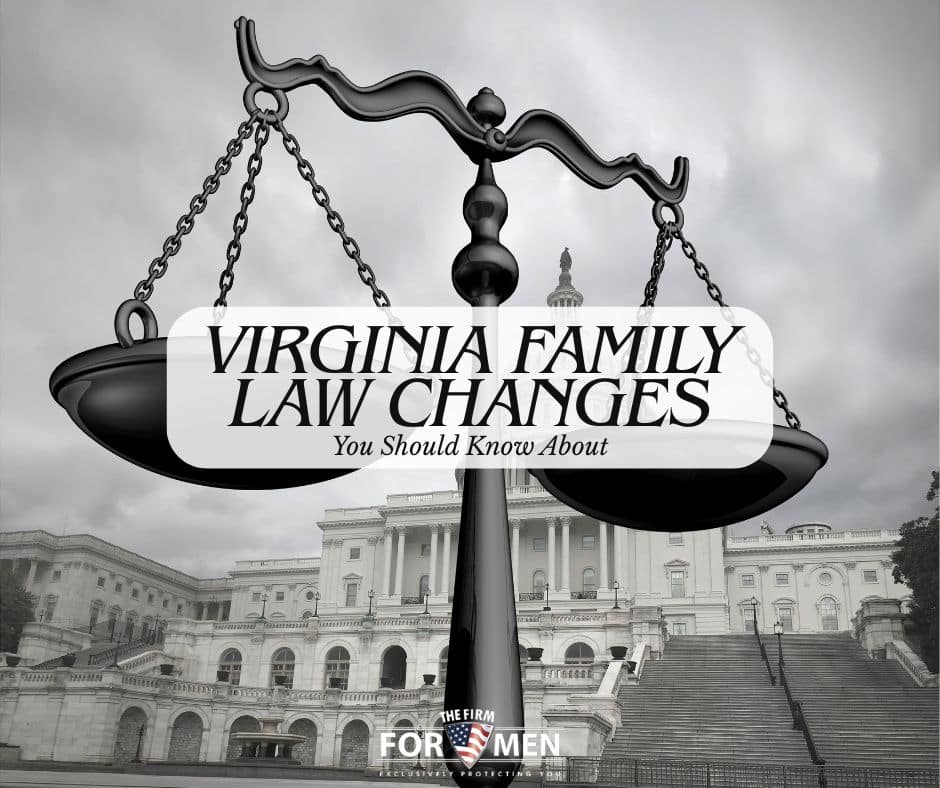Each year, the Virginia General Assembly revisits, revises, and occasionally reinvents the laws that shape family life in the Commonwealth. While some people argue that laws should remain constant, history reminds us that even long-standing rules eventually evolve. If that were not the case, George Washington’s 1776 Order Against Profanity would still be enforceable — a “crime” that remained on the books until 2020. Of the 599 bills recently signed into law, several significant updates directly affect Virginia family law, divorce, parental rights, child support, military families, and long-term protective order protections. Below, we break down the changes that matter most to Virginia men and fathers.
Jump to a Section
- Child Marriage Law Reform
- Expanded Parental Rights to Records
- Major Changes to Child Support Laws
- Updated Spousal Support Requirements
- New Protections Affecting Military Divorce
- Longer-Lasting Protective Orders
- Why Having the Right Attorney Matters
Child Marriage Law Reform
In 2024, Virginia became the first southern state to set the legal age of marriage at 18 with no exceptions, closing loopholes that once allowed minors to marry under certain circumstances. This reform appears most prominently in Code of Virginia § 20-48. Minimum age of marriage, which now states simply:
“The minimum age at which persons may marry shall be 18.”
While Virginia led the South in setting this standard, it was the 12th state nationwide to take action. According to nonprofit organization Unchained At Last, several states — including California, Mississippi, Oklahoma, and New Mexico — still have no minimum marriage age at all, and places like Kansas permit marriage as young as 15. The General Assembly’s update brings Virginia into alignment with modern child protection norms and prevents forced or coerced underage marriages.
Expanded Parental Rights to Records
Previously, noncustodial parents in sole-custody situations sometimes faced barriers accessing crucial academic or health information about their children. Effective July 2025, as recorded by LegiScan, Virginia ensures that both parents maintain equal legal rights to digital and online educational and health records.
The updated language in Code of Virginia § 20-124.6 now clarifies that parents cannot be denied access to these records — including those stored on secure online portals — unless a court orders otherwise for good cause.
Old version vs. new version (emphasis added):
OLD: Neither parent shall be denied access to academic or health records … unless otherwise ordered by the court.
NEW: Neither parent shall be denied access, including any such records stored or accessible from a secure website, unless otherwise ordered by the court.
This modernization ensures equal access regardless of which digital systems schools, daycares, or medical providers use.
Major Changes to Child Support Laws
Several significant shifts affect child support calculations and temporary support rulings.
Protective Orders Now Trigger Temporary Child Support
Since July 1, 2024, Virginia courts can award temporary child support simultaneously with the issuance of a protective order. This support remains in place until it expires or is replaced by a standard child support order.
New Upper Income Guidelines for Support (Effective July 1, 2025)
One of the biggest changes involves raising the combined gross monthly income threshold from $35,000 to $42,500 under § 20-108.2. This adjustment increases the guideline ranges for high-income families, simplifying calculations and providing updated benchmarks.
The old $35,000/month limit equaled a combined annual income of $420,000; the new $42,500/month threshold equals $510,000 per year. Legislators already had a fallback formula for incomes exceeding the cap, applying a percentage of earnings above the maximum:
| Children | Percentage of Income Above Threshold |
|---|---|
| One child | 2.6% |
| Two children | 3.4% |
| Three children | 3.8% |
| Four children | 4.2% |
| Five children | 4.6% |
| Six children | 5.0% |
The new $42,500 cap required fresh guidelines in $50 increments. The new base calculations begin at $3,306 for one child.
Example Comparison
Before July 2025:
Parents earning $50,000/month (i.e., $15,000 above the old limit) owed:
- $1,989 (base) + 2.6% of $15,000 ($390) = $2,379/month
After July 2025:
- $3,306 (new base) + 2.6% of $7,500 ($195) = $3,501/month
This results in a dramatic increase of $1,122 per month.
Updated Spousal Support Requirements
Virginia’s spousal support statute, § 20-107.1, has evolved through numerous amendments (1982 to 2024). A notable 2018 change allowed retirement at full Social Security age to qualify as a “material change in circumstances” for adjusting support.
The 2024 amendment now requires courts to include detailed information about overpayments in any original or modified support order:
- Who is owed reimbursement
- The time period during which overpayment occurred
- How repayment will be made
This ensures fairness for payors who may have inadvertently paid too much.
New Protections Affecting Military Divorce
Virginia’s evolving laws continue to address the unique needs of military families. One symbolic but meaningful update adds the U.S. Space Force to the Virginia Military Parents Equal Protection Act, ensuring equal treatment for custody and support issues across all service branches.
More significantly, beginning July 1, 2025, the Commonwealth now recognizes Military Protective Orders (MPOs) as evidence in civilian protective order hearings under § 16.1-253.1. This empowers judges to issue preliminary protective orders based on an MPO alone, strengthening safety protections for military spouses and children.
Additionally, law enforcement must now notify military authorities if a service member violates a civil protective order. These changes create closer cooperation between civilian courts and the armed forces.
Longer-Lasting Protective Orders
Virginia Code § 16.1-279.1 previously limited family-abuse protective orders to two years. The updated law allows four-year protective orders if the respondent has had a prior order within the last decade.
Updated language (emphasis added):
“… the protective order may be issued for a specified period of time up to a maximum of four years … if the court finds … a previous order issued within 10 years …”
The statute still allows unlimited renewals — meaning victims no longer need to reappear in court as frequently.
Why Having the Right Attorney Matters
These legislative revisions are only part of the sweeping changes affecting divorce, custody, support, and protective order cases in Virginia. The timelines for appealing judicially ordered sales of marital property, for example, have been shortened dramatically. Under § 8.01-675.3, appeals must now be filed within 30 days rather than 12 months.
The legal landscape is increasingly complex. The right attorney can help you navigate every adjustment, protect your rights, and ensure no procedural change jeopardizes your future.
If you need guidance on how new Virginia family laws impact your divorce, custody case, child support obligations, or protective order, contact The Firm For Men at (757) 383-9184. We help men across Virginia cut through the thickest legislative weeds and protect what matters most.

